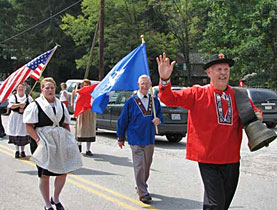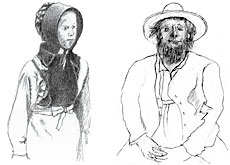Tiny US village celebrates its Swiss roots

The community of Helvetia in the American state of West Virginia has just celebrated its annual fair, complete with Swiss costumes, flags, cowbells and alphorns.
Founded by the Swiss in 1869, Helvetia is proud of its roots and keeps its traditions flourishing despite having a population of only about 100 and being described as “isolated” in a high mountain valley.
“I grew up in Ohio but I spent every summer in Helvetia at the home of my grandmother, whose mother was from the Merkli family of Windisch in canton Aargau,” Eleanor Betler told swissinfo.
One day Eleanor met in the local mixed choir Howard Betler, whose parents were Bernese. She married him, settled in Helvetia and raised four children, while also devoting time to the community.
Fascinated by history, she helped set up local archives in the early 1960s, bringing together photographs, letters, accounts about the community and various documents.
“Tourists come almost every day to visit our village and consult the archives in the library. There are many people who have Swiss roots in this country,” Betler said.
Pioneering
Helvetia was founded in 1869 by a group of Swiss immigrants who were driven away by the industrial revolution.
“They had heard that the Virginia mountains looked like Switzerland a little. They were so homesick that they came here and built [homes] with their own hands. It was pioneering history,” Betler explained.
The local historian said the settlers numbered eight at the beginning. They built a cabin and started to cultivate the land and construct farms. They were joined by their families and then by others, “some even coming from Canada”.
Helvetia had a population of 380 in 1874. At the beginning of the 20th century the number swelled to about 1,000 with the arrival of the railway and the opening of a chemical factory.
Today there are no more than about 100. There are still some farmers, while others work in open pit coalmines or earn a living as truck drivers.
The graves in the Helvetia cemetery tell the story of the past, with such names as Kellenberger, Teuscher, Lehman, Anderegg, Marti, Daetwyler and Zumbach featured on them.
In 1980 another villager, David Sutton, wrote his doctoral thesis on these families.
“The book is unfortunately out of print and we have just asked the Swiss American Historical Society to help us reprint it,” Betler said.
German spoken here
The settlers came mainly from Bern and the Simmental but some came from the villages of Wettingen and Windisch in canton Aargau, as well as from Germany. Swiss-German and German were spoken for a long time.
“The minutes and records of agricultural, communal and parish meetings were only written in English after 1928,” Betler noted.
“When my father-in-law was a child, they only spoke dialect at home. In his elementary school, they only began English in the third or fourth year. Then at the time of the Second World War they gave up their native language because they didn’t want to be thought of as Germans.”
Betler has been to Switzerland twice, most notably last autumn to Flums in canton St Gallen.
“I went to visit Windisch, the village of my grandmother, and I’d like to return for a longer stay. I was always fascinated by our Swiss origins. As a small girl, I tried to learn folk dances and now I’m a member of the yodel club with one of my daughters, who is an excellent singer.”
Festivals
Helvetia does not only have the name as a reminder of its origins because it still celebrates festivals that take place in Switzerland.
There’s the Fasnacht carnival on the weekend before Ash Wednesday with masks and a procession.
The fair on the second weekend in September, which “celebrates harvest and Swiss heritage”, is also an occasion for an alpine parade with Swiss costumes and carts, one of which is pulled by Bernese mountain dogs.
On the Saturday nearest October 20, Helvetia’s day celebrates the arrival of the first Swiss and Germans in 1869. A historical walk re-enacts the journey of the settlers in the Appalachians.
And on the first Saturday in December, the locals celebrate Saint Nicholas with spiced rolls and a visit by the patron of children himself.
Last but not least, there is a large grill party on August 1 – Swiss national day – “with folk dances, Swiss songs and yodelling of course” says Betler. Swiss flag throwers also feature, as does a concert with alphorns.
swissinfo, based on an article in French by Isabelle Eichenberger
Founded in 1869 by immigrants from Bern and the Simmental, as well as from the villages of Wettingen and Windisch in canton Aargau, Helvetia reminded the settlers of Switzerland.
They cultivated the land, constructed farms and built a church (by 1870) and then brought their families.
In 1871 there were already 32 people there and three years later 380 (90 families). At the beginning of the 20th century there were up to 1,000 residents.
Today there are only about 100 people in the community. They work in open-pit coal mines or as truck drivers.
Situated in the Appalachians (hence the name “Mountain State”), West Virginia became independent in 1776.
West Virginia is the only state in the Union to secede from a confederate state, Virginia, during the American Civil War. It was admitted to the Union as the 35th state on June 20, 1863. Its capital is Charleston.
Helvetia is situated at 850 metres above sea level in Randolph county.

In compliance with the JTI standards
More: SWI swissinfo.ch certified by the Journalism Trust Initiative











You can find an overview of ongoing debates with our journalists here . Please join us!
If you want to start a conversation about a topic raised in this article or want to report factual errors, email us at english@swissinfo.ch.